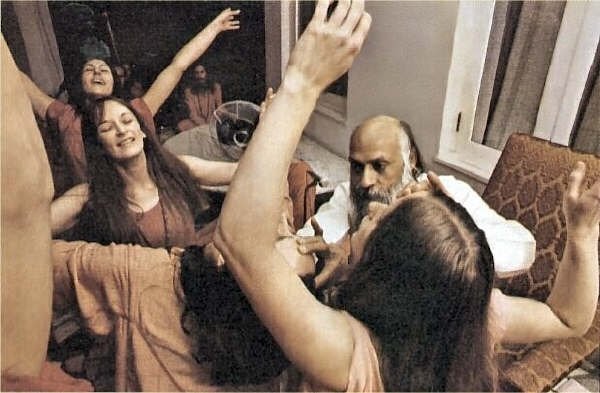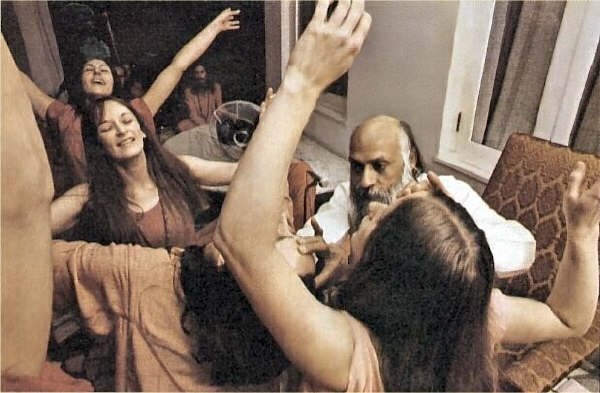YOU TOLD ME THAT MY MIND IS IMMATURE. WHAT DOES IT MEAN TO HAVE A MIND THAT IS MATURE?
To think that you know is to be immature. To function from knowledge, from conclusion, is to be immature. To function from no-knowledge, from no conclusion, from no past, is maturity.
Maturity is deep trust in your own consciousness; immaturity is a distrust in your own consciousness. When you distrust your consciousness you trust your knowledge, but that is a substitute and a very poor substitute at that.
Try to understand this — it is important.
You have been living, you have experienced many things; you have read, you have listened, you have thought. Now all those conclusions are there.
When a certain situation arises. you can function in two ways. You can function through all the accumulated past, according to it — that’s what I mean by functioning through a center. through conclusions, through experience, stale, dead — then whatsoever you do your response is not going to be a response, it will be a reaction. And to be reactionary is to be immature.
Or, if you can function right now, here in this moment, through your consciousness, through your being aware, putting aside all that you have known — this is what I call functioning through no-knowledge, this is functioning through innocence. And this is maturity.
The mind is immature when it is not ready to learn. The ego feels very fulfilled if it need not learn anything from anybody; the ego feels very enhanced if it feels that it already knows. But the problem is that life goes on changing, it is never the same; it goes on flowing, it is a flux. And your knowledge is always the same. Your knowledge is not evolving with life, it is stuck somewhere in the past, and whenever you react through it you will miss the point because it will not be exactly the right thing to do.
Life has changed but your knowledge remains the same. and you act out of this knowledge. That means you face today with your yesterday’s knowledge. You will never be able to be alive. The more you function through knowledge, the more immature you become.
Now let me tell you a paradox: every child who is innocent is mature.
Maturity has nothing to do with age because it has nothing to do with experience; maturity has something to do with responsiveness, freshness, virginity, innocence. So when I use the word ‘mature’ I don’t mean that when you become more experienced you will be more mature. That’s what people usually mean when they use the word — I don’t mean that. The more you gather knowledge, the more your mind will become immature; and by the time you are seventy or eighty, you will be completely immature because you will have a stale past to function through. Watch a small child…knowing nothing, having no experience, he functions here and now.
That’s why children can learn more than aged people. Psychologists say that if a child is not forced to learn, not forced to discipline himself, he can learn any foreign language in three months. Just left to himself with people who know the language he will catch it in three months. But if you force him to learn, it will take almost three years, because the more you force, the more he starts functioning through whatsoever he learns, through yesterday’s knowledge. If he is left to himself he moves freely, spontaneously; learning comes easy, by itself, on its own accord.
By the time the child reaches the year eight he has learned almost seventy per cent of whatsoever he is going to learn in his whole life. He may live eighty years, but by the time he is eight he has learned seventy per cent — he will learn only thirty per cent more, and every day his capacity to learn will be less and less and less. The more he knows, the less he learns.
When people use the word ‘maturity’ they mean more knowledge; when I use the word ‘maturity’ I mean the capacity to learn. Not to know but to learn — and they are different, totally different, diametrically opposite things. Knowledge is a dead thing; the capacity to learn is an alive process — you simply remain capable of learning, you simply remain available, you simply remain open, ready to receive.
Learning is receptivity. Knowledge makes you less receptive because you go on thinking that if you already know, what is there to learn? When you already know. you miss much; when you don’t know anything you cannot miss anything.
Socrates said in his old age, ‘Now I know nothing!’ That was maturity. At the very end he said, ‘I know nothing.’
Life is so vast. How can this tiny mind know? At the most, glimpses are enough. Even they are too much. Existence is so tremendously vast and infinite, beginningless, endless… how can this tiny drop of consciousness know it? It is enough even that a few glimpses come, a few doors open, a few moments happen when you come in contact with existence. But those moments cannot be turned into knowledge.
And your mind tends to do it — then it becomes more and more immature.
So the first thing is that you should be capable of learning and your learning capacity should never be burdened by knowledge, never be covered by dust. The mirror of learning should remain clean and fresh so it can go on reflecting.
The immature mind is always interested in things: money, houses, cars, power, prestige…all trivia, all rot. The mature mind is interested in existence, in being, in life itself. So when I say to you that you have an immature mind I mean you are still interested in things, not in persons; still interested in the outside, not in the inside; still interested in objects, not in subjectivity; still interested in the finite, not interested in the infinite.
Just watch your mind — where it moves, what its fantasies are. If you find a valuable diamond on the road and just there by its side a rose has flowered, in what will you be interested? In the rose or in the diamond? You will not be able to see the rose if you are interested in the diamond; you will simply miss the rose, it is valueless. Your eyes will be too clouded by the diamond, your whole mind will become focused on the diamond, and you will miss another diamond which was more alive — the rose.
The immature mind is more interested in glasses than in life and death and love; more interested in things, like houses and cars. When I tell you that you have an immature mind, I mean you are still interested in that which is worthless, non-essential. At the most it can be used, at the most it can become a decoration in life, but it cannot replace life, it cannot substitute life, it cannot become life itself.
learn how to share. If you know how to share, you are mature; if you don’t know how to share, you are immature.
This sharing goes on on all levels, in all directions, in all dimensions. So one of the most basic things to understand is the more you share something, the more it grows in you. Share whatsoever you have and it will grow; cling to it, become afraid of sharing, of friendship, of love, and it will shrink’. Life knows only one law and that law is of expansion and sharing.
Look at nature. Nature is such a spendthrift. When one flower is needed, a thousand and one flowers will bloom.
Nature is a spendthrift. Where one flower is needed it produces millions. One tree will produce…. Look at the Gulmohr — millions of seeds are ready. They will all fall down and a few, one, two, four, five, ten, twenty, a hundred, may become trees. Why so many seeds? God is not a miser. If you ask for one he gives millions. Just ask! Jesus has said, ‘Knock and the doors shall be opened unto you, ask and it shall be given.’ Remember, if you ask for one, millions will be given.
The moment you become miserly you are closed to the basic phenomenon of life: expansion, sharing. The moment you start clinging to things, you have missed the target — you have missed. Because things are not the target, you, your innermost being, is the target — not a beautiful house, but a beautiful you; not much money, but a rich you; not many things, but an open being, available to millions of things.
When I say you are immature, I mean you are too concerned with things and you have not yet learned that life consists of consciousness — of beings, not of things. Things are to be used, they are needed, but don’t start living by them. Man cannot live by bread alone — once living by bread alone, things alone, you are already dead.
And the third thing: maturity is always spontaneous. It does not plan, it makes no rehearsals.
When I say you are immature I mean that you prepare your questions, your inquiries. They are mind things. they don’t come from your heart, they are not related to you, they have no roots in you.
I call a mind mature which retains the capacity to be surprised. A mind is mature if it goes on continuously being surprised. by others, by himself, by everything. Life is a constant wonder: he has no ready-made plans or ready-made responses for it, he never knows what is going to happen, he moves into the unknown each moment. And he never jumps ahead of himself, he never lags behind himself, he remains simply himself, wherever he is.
And, the last and most basic thing: when I say that you have an immature mind, basically I mean that you have a mind. Mind as such is immature; only no-mind is mature.
Maturity has nothing to do with mind because mind means all that you know; mind means your experiences, mind means your past, your rehearsals, your preparations. All these things are implied in the word ‘mind.’ Mind is not something in particular, it is the whole accumulation, all the junk, the whole heap, of your dead past.
When I say, ‘Be mature,’ I mean become a no-mind. If you act spontaneously, you will act out of no-mind. If you remain capable of learning, you will remain capable of being a no-mind again and again and again — the mind will never be accumulated. If you are capable of remaining alert-and spontaneous, able to be surprised by life and by yourself, you will become by and by more and more interested in the interior-most life, in the core of life. When you see a person, you will not see just the body, your gaze will become penetrating, your gaze will become like an x-ray. It will catch hold of the person — of the consciousness there, of the inner light there in the other person.
The body is just an abode — you will meet the person, you will shake hands, but not only hands, you will shake the person, you will meet the person. And in your own life, by and by, you will become aware that the body is just the outermost garment: you have to take care of it, it is not to be neglected, it is valuable, but it is not the end. You are the master, not the servant. And by and by, the more you penetrate withinwards, you will see that the mind also is an innermost garment — more valuable than the body but not more valuable than you. You remain the supreme value.
Once you know your supreme value, you have become mature; and once you know your supreme value, you know the supreme value of all: all beings are Buddhas — nobody is less than that; the whole of life is Divine; you are always walking on holy ground.
All ground, the whole earth, the whole existence is sacred. Once you have that feeling entering you, I will call you mature — not before that. A mature mind is a religious mind.
OSHO



